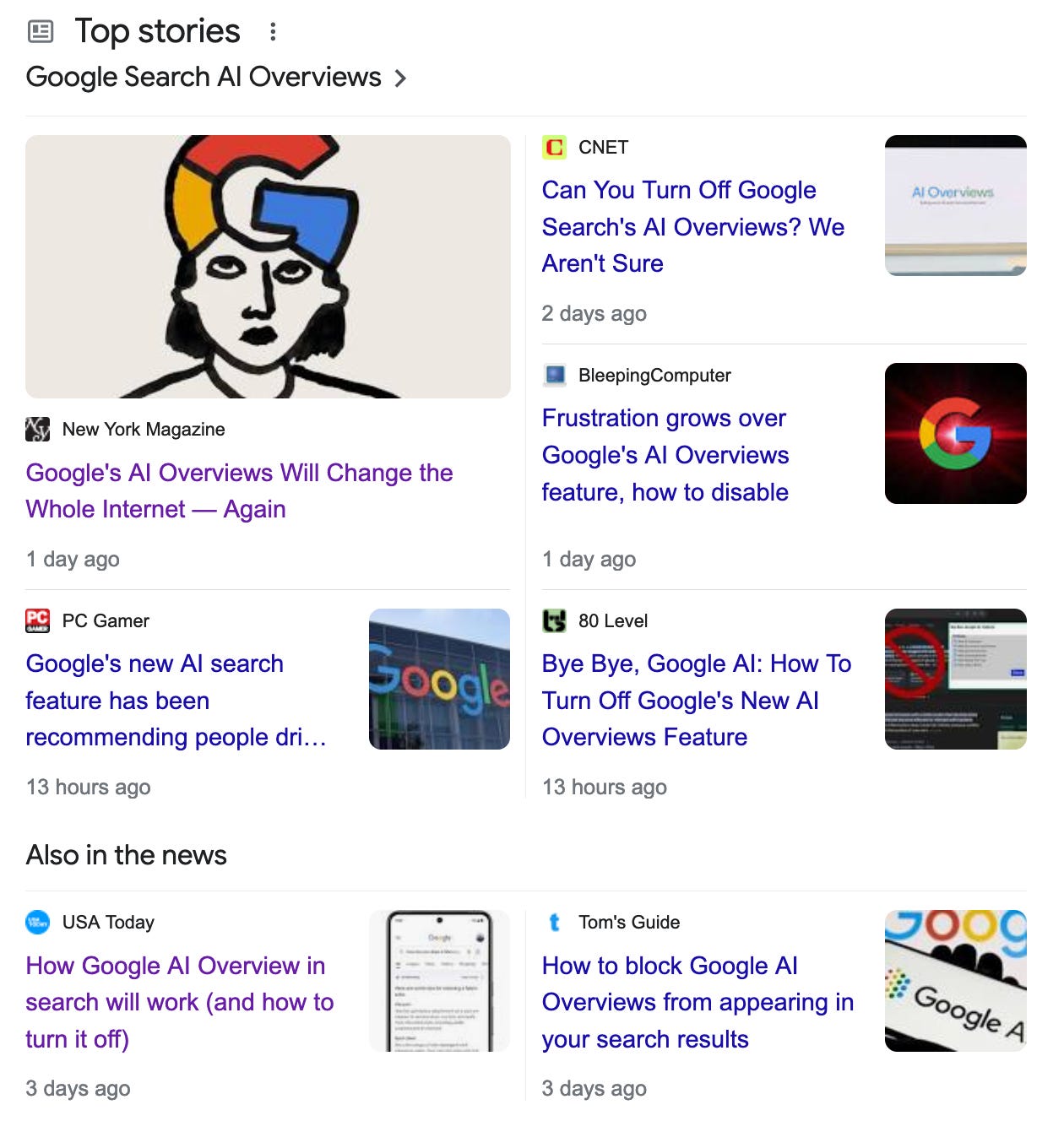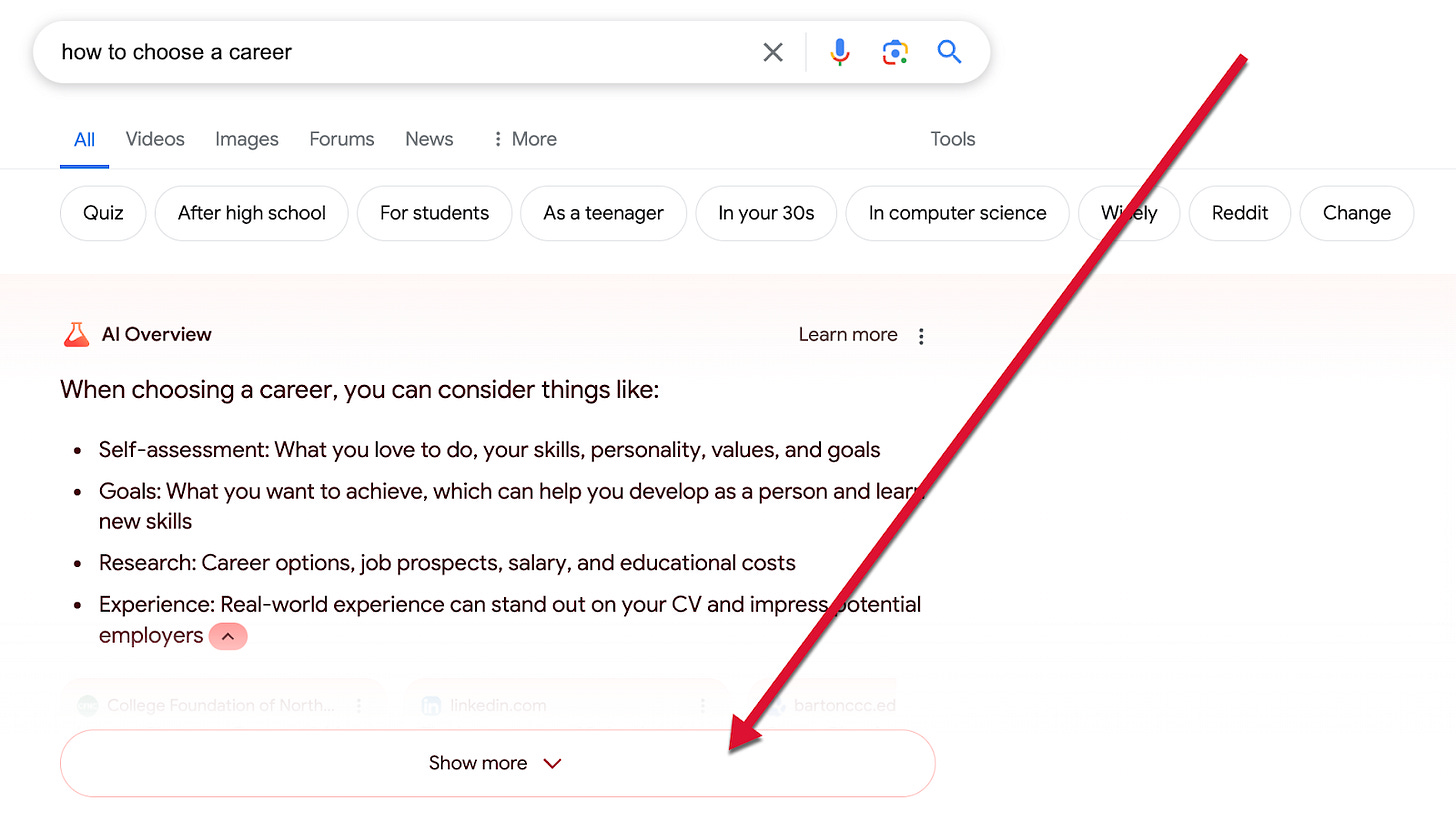
Google’s AI Overviews (SGE): What Business Owners Need to Know
Google has launched AI Overviews for everyone. Are we freaking out?
Last week Google finally announced its generative AI feature - AI Overviews - going live for everyone. Google had been testing this feature - then known as Search Generative Experience (SGE) - for months, and now after generally “positive feedback” from testers, it is live for everyone.
**** Make sure to watch my podcast interview on this topic here and join me over at free Wix webinar here. ***
AI Overviews summarize search results for some queries. We don’t know just yet the percentage of queries Google will serve AI Overviews for.
For queries it does show up, the feature works in either of two ways:
An expandable AI answer on top of search results. This pushes organic search results further down the page.
A “Generate” button allowing you to create an AI Overview by clicking it.
The latter option is less intrusive but we don’t know yet which one will be more frequent because the feature is brand new.
Initial observations from threads and discussions:
AI overviews don’t show up nearly as often as they did when I was testing them as part of the SGE experiment. This is my personal observation but a promising one.
AI overviews show up for more ambiguous queries (especially those phrased as questions)
AI overviews don’t handle freshness well: A lot of outdated advice is being found in the answers
AI overviews grab answers and links from various search results, not necessarily ranking in top 10. There’s no EEAT factors in place here. Pure question-answer matching.
They are pretty easy to game if you answer that question within a sentence on your page. This could actually be an opportunity to show up above the fold if you don’t rank in top 10. Think of featured snippets, only much stupider
There’s a flood of examples being tweeted and shared all over the web on how AI overviews confidently give wrongful and stupid answers. We all knew the product wasn’t ready.
“How to block AI overviews” question is getting insanely popular. Just take a look at these headlines:
You can block Google from showing your site inside AI answers by using Nosnippet, Max-snippet, or data-nosnippet meta tags but any of these may also impact your organic search snippets, so I’d recommend waiting for some data to accumulate before you make this decision. If you notice a drop in clicks as a result of an AI answer for your important query, this is something you can experiment with to gain some traffic back.
AI answers often contain links referencing its sources, and Google claims that those links are more clickable than organic search.
To be fair, there are initial studies that seem to conform this claim but I am still skeptical. We shall see!
We cannot verify this information because Google doesn’t offer web publishers any click-through data from AI answers inside Search Console yet.
I doubt the clickability claim because in many cases references are not even visible until you expand an answer:
Make sure you are keeping an eye on your important pages to promptly notice traffic losses. You can do this using Search Console and GA4 (I recommend keeping an eye on both). Using Search Console, make sure to identify search queries that bring fewer clicks and search for them to see if there are AI overviews showing for them.
Overall, the SEO impact of AI overviews is still impossible to evaluate because they are brand new.
Organic search results have been getting fewer clicks for many years now due to all the new sections that are being added to search result pages. I assume this is just another new section that will contribute a bit to this old trend.
Still, keeping an eye on your traffic losses is important.
The main takeaway here is that AI Overviews rely on what is currently ranking for each given query, so organic rankings are key for being surfaced in AI answers. So fundamentally, SEO isn’t changing. It is still about getting each page of your site indexed and ranked for relevant queries.












